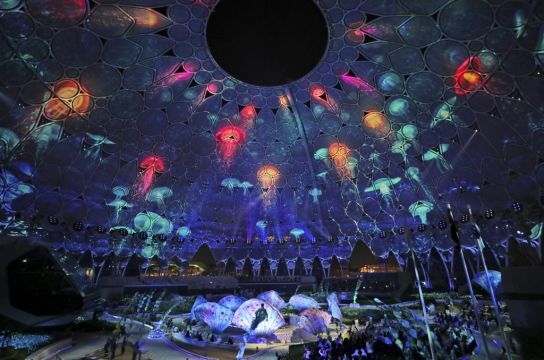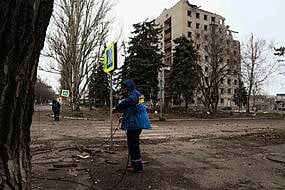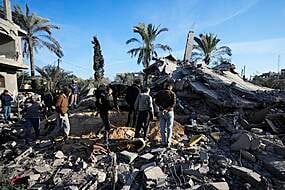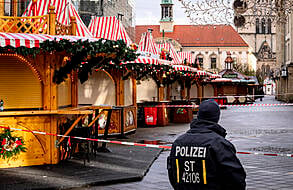The Middle East’s first World Fair featuring 192 nations has begun in Dubai with a spectacular opening ceremony.
Named Expo 2020, the event was postponed by a year due to the outbreak of the coronavirus last year.
While that could have an impact on how many people flock to the United Arab Emirates, the six-month-long exhibition offers Dubai a momentous opportunity to showcase its East-meets-West appeal as a place where all are welcome for business.
Not long ago, the site of the 1,080 acre expo was barren desert.

Less than a decade later, it is a futuristic landscape with a centerpiece dome, marketed as the world’s largest 360-degree projection screen, robots, a new metro station, multimillion-dollar pavilions and districts with names like “sustainability” and “opportunity” — all built, like much of the Gulf, by low-paid migrant workers.
Organisers say 192 nations are represented at the expo.
The US pavilion showcases a replica of the Space X Falcon 9 rocket while Italy’s pavilion houses a 3D replica of Michelangelo’s biblical hero, David, that is 17ft high.
Other attractions include an African food hall, a royal Egyptian mummy, concerts and performances from around the world, and the option to dine on a 500 dollar three-course meal with glow-in-the-dark cuisine.

Since first making a splash in London in 1851, world fairs have long been an opportunity for nations to meet, exchange ideas, showcase inventions, promote culture and build business ties.
For more than a century, these global exhibitions have captured the imagination and showcased some of humanity’s most important innovations.
The first World Fair held in the United States in 1876 debuted Alexander Graham Bell’s telephone, the typewriter, a mechanical calculator and Heinz Ketchup.
Held in Philadelphia, Pennsylvania, that fair attracted nearly 10 million people at a time when the entire US population was estimated to be just 40 million. One of its main buildings, Memorial Hall, is now a museum.

Other fairs showcased inventions like the sewing machine, the elevator, carbonated soda, the Ferris wheel and, in 1939 in New York, the television.
This year’s expo is happening amid a global pandemic, when untold numbers are still working and studying remotely — and connecting to the world virtually.
It is unclear how many visitors Dubai can attract, and how much the expo will stimulate its tourism-driven economy.
To enter the expo site, visitors will need to show a negative PCR test or proof of Covid-19 vaccination.
Dubai’s ruler and the force behind the emirate’s transformation, Sheikh Mohammed bin Rashid Al Maktoum, said Expo 2020 is a chance to showcase the best of human excellence.

“It offers a platform to forge a united worldwide effort to build a more sustainable and prosperous future for all of mankind,” he told guests at the expo’s opening ceremony on Thursday night.
Sheikh Mohamed bin Zayed Al Nahyan, crown prince and de-facto ruler of the UAE’s seat of power, Abu Dhabi, used his speech to emphasise “the ethos of this land” as a meeting point for cultures and tolerance.
However, Human Rights Watch said organisers are promoting an inaccurate image of the UAE as an “open and tolerant country” for public relations purposes.
Instead, it said in a scathing report that “abusive authorities forcefully bar all peaceful criticism and dissent” in the country, jailing activists and carrying out pervasive domestic surveillance programmes.
“The UAE has embarked on a decades-long effort to whitewash its reputation on the international stage,” the rights group said.







